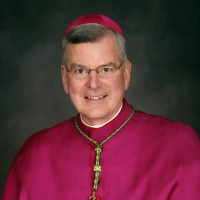The archbishop of St. Paul, Minnesota, and a deputy bishop have resigned after prosecutors there charged the archdiocese with having failed to protect children from unspeakable harm from a pedophile priest.
The Vatican said Monday that Pope Francis accepted the resignations of Archbishop John Nienstedt and Auxiliary Bishop Lee Anthony Piche. They resigned under the code of canon law that allows bishops to resign before they retire because of illness or some other “grave” reason that makes them unfit for office.
In order to give the Archdiocese a new beginning amidst the many challenges we face, I have submitted my resignation as Archbishop of Saint Paul and Minneapolis to our Holy Father, Pope Francis, and I have just received word that he has accepted it. The Catholic Church is not our Church, but Christ’s Church, and we are merely stewards for a time. My leadership has unfortunately drawn attention away from the good works of His Church and those who perform them. Thus, my decision to step down.
It has been my privilege the last seven years to serve this local Church. I have come to appreciate deeply the vitality of the 187 parishes that make up the Archdiocese of Saint Paul and Minneapolis. I am grateful for the support I have received from priests, deacons, religious men and women and lay leaders, especially those who have collaborated with me in the oversight of this local Church.
I leave with a clear conscience knowing that my team and I have put in place solid protocols to ensure the protection of minors and vulnerable adults.
I ask for continued prayers for the well-being of this Archdiocese and its future leaders. I also ask for your continued prayers for me.
Stay tuned.
Meanwhile, the background is here.
FOOTNOTE: A few people have wondered what happens to a bishop when he resigns. While circumstances may vary, canon law offers this:
Can. 401 §1. A diocesan bishop who has completed the seventy-fifth year of age is requested to present his resignation from office to the Supreme Pontiff, who will make provision after he has examined all the circumstances.
- 2. A diocesan bishop who has become less able to fulfill his office because of ill health or some other grave cause is earnestly requested to present his resignation from office.
Can. 402 §1. A bishop whose resignation from office has been accepted retains the title of emeritus of his diocese and can retain a place of residence in that diocese if he so desires, unless in certain cases the Apostolic See provides otherwise because of special circumstances.
- 2. The conference of bishops must take care that suitable and decent support is provided for a retired bishop, with attention given to the primary obligation which binds the diocese he has served.
ALSO: I asked a priest who is a canon lawyer, very simply, “What can you do with a former archbishop in this situation?” With men like Bishop Finn and now Archbishop Nienstedt suddenly unemployed…what happens? He wrote:
I would think that they are retiring so that, obviously, does not carry with it any canonical penalties or restrictions. I would think that, unless he chooses otherwise or is told that it’s better that he not, the retired bishop would conduct himself like any retired bishop, doing confirmations and other events.I would say it would be highly unlikely that he would be reassigned anywhere.
UPDATE: Also weighing on this are Kathy Schiffer and Elizabeth Scalia. Elizabeth has this choice observation from Minnesota native Ed Morrissey:
The new revelations about the lack of action on Wehmeyer and four other priests named in the indictment angered people all over again. Priests were addressing it during Mass to acknowledge the anger and frustration from parishioners who thought the archdiocese and the Church as a whole had learned their lesson. On the other hand, the staff at the chancery has changed significantly in response to the later scandals, and the new vicar general — a friend of mine — is a no-nonsense priest who takes the job of righting the ship very, very seriously.
The resignations of Nienstadt and Piche may give the archdiocese a chance to truly turn a corner, bolstered by a Pope whose own anger and frustration over the scandals has become very well known. It’s a second chance, and an opportunity to clear the air. There may be more shoes to drop from the prosecutors in this case, but the new archbishop will be on notice to ensure that there will be no repeat — unless he wants to find himself on trial in the Vatican, too.
Photo via Archdiocese of St. Paul / Minneapolis website












